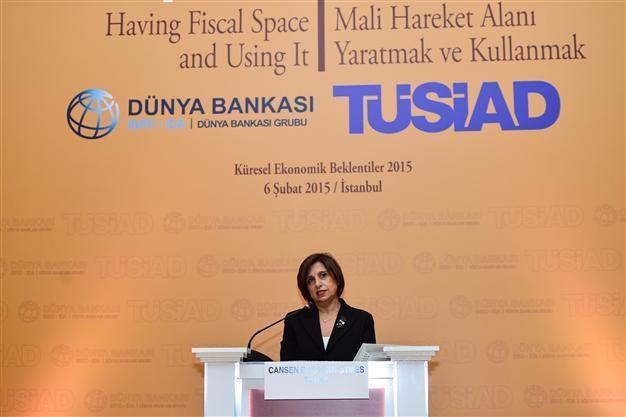Turkey's top business group urges maintenance of institutions’ independence
ISTANBUL - Doğan News Agency

AA Photo
The independence of the Central Bank and similar institutions is important for business circles, the head of Turkey’s top business organization has said, calling for an end to recent developments that cast a shadow over the independence of key institutions.
“As businesspeople, we value the independence of independent bodies,” Cansen Başaran Symes, the new head of the Turkish Industry and Business Association (TÜSİAD) said on Feb. 6 at the launch of the World Bank’s Global Economic Prospect Report.
“I want once again to underline the importance of this for the Turkish economy, as we have been repeating in all our statements. TÜSİAD’s approach on the issue will not change under any circumstances. Personally and in the name of TÜSİAD, I hope to see disturbing developments on the issue, which are confusing the minds of the business community and the public, come to an end,” Symes added.
She noted that the primary objective of a central bank is to achieve and maintain price stability, rather than creating prosperity or economic growth. Her remarks came amid a series of heated discussions between the Central Bank and government figures in Turkey.
“There is no monetary policy or fiscal policy behind medium or long-term growth. These policy instruments can only pave the way to establishing an environment for doing business, making investments, creating employment and increasing innovation. More than that is needed to maintain economic growth,” she said.
According to the World Bank’s new report, several major forces are at play in the global outlook, affected by soft commodity prices and low interest rates, but also by increasingly divergent monetary policies across major economies and weaker world trade.
“In particular, the sharp decline in oil prices since mid-2014 will support global economic activity and help offset some of the headwinds to growth in oil-importing developing economies. However, it will dampen growth prospects for oil-exporting countries, with significant regional repercussions. Overall, global growth is expected to rise moderately, to 3.0 percent in 2015, and average about 3.3 percent through 2017,” said the report.
Risks to the slow-moving global recovery remain significant, while financial markets’ volatility could sharply raise developing countries’ borrowing costs, an unwelcome development after several years of heavy capital market issuance by some developing countries.
“Intensifying geopolitical tensions, bouts of volatility in commodity markets or financial stress in a major emerging market could lead to a reassessment of risk assets. If the eurozone or Japan slips into a prolonged period of stagnation or deflation, global trade could weaken even further,” stated the report.
